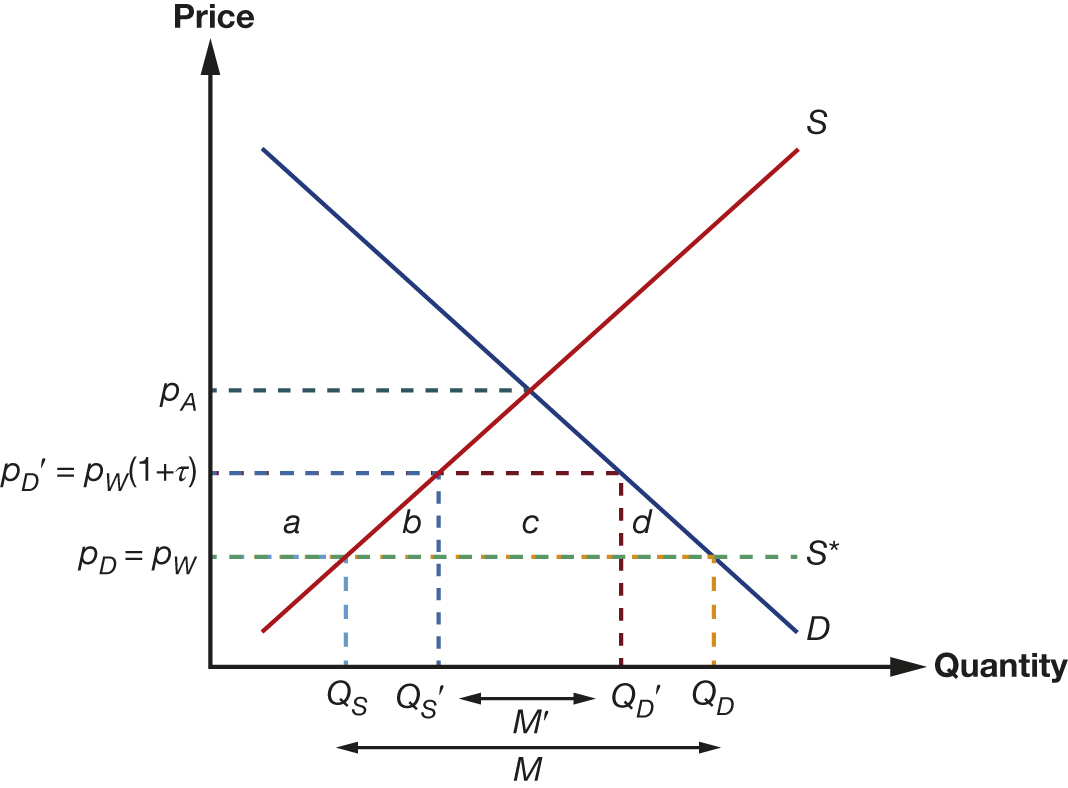From NBC via Bloomberg:
“I hope they raise their prices, because if they do, people are going to buy American-made cars,” he said, repeating the phrase “I couldn’t care less” two more times in his lengthy answer.
I think Trump doesn’t understand what a tariff does. It’s not that the pre-tax price of imports goes up (it likely stays constant or declines, ceteris paribus). Rather the post-tax/tariff-inclusive price goes up.
More fundamentally, if US automakers are profit maximizers, they should raise their prices. That happened when the Japan implemented voluntary export restraints (VERs) on imported autos (my first task as a RA for … Peter Navarro in 1982; also one of my first tasks as a RA for Robert Crandall). To see this, consider Figure 8.1 from Chinn-Irwin, International Economics. See Navarro, The Policy Game (1984).
Source: Chinn, Irwin, International Economics (Cambridge, 2025).
Prices of foreign produced autos as faced by US consumers rise from Pw to Pw(1+t). Imports fall from M to M’. US produces additional Qs’-Qs units at home IF US AUTO PRODUCERS ALSO RAISE PRICES TO MATCH Ps(1+t).
So Mr. Trump’s statement makes no sense. What is true is producer surplus going to US automakers and workers will rise. Of course, this partial equilibrium approach ignores the higher costs imposed on US automakers by tariffs on steel and aluminum, and other inputs.

One of the justifications for tariffs that Trump uses is that it will create more manufacturing jobs for Americans by moving factories back to the US. But this notion is as out of date as the McKinley tariffs.
After WWII, manufacturing jobs were seen as a step upward to the middle class for wage earners. But this wasn’t because of some virtue of manufacturing jobs. It was because manufacturing jobs tended to be unionized and unions meant higher that average wages. But unions for manufacturing jobs have been declining steadily since the Reagan years. Around the year 2000 there was a crossover in which manufacturing jobs now pay less than average. Manufacturing jobs aren’t that great anymore. A lot of this is because manufacturing jobs have moved to southern anti-union states.
So there is no reason to glorify manufacturing jobs anymore. Even if they moved auto factories back to the US, they would be in the south, non-unionized and below average wage jobs. Unions make good jobs, not factories. The evisceration of the NLRB has made this worse.
Yep:
https://fred.stlouisfed.org/graph/?g=1G7Bg
And yep:
“The union membership rate–the percent of wage and salary workers who were members of unions–was 9.9 percent in 2024, little changed from the prior year, the U.S. Bureau
of Labor Statistics reported today…In 1983, the
first year for which comparable data are available, the union membership rate was 20.1 percent…The union membership rate of public-sector workers (32.2 percent) continued to be more than five times higher than the rate of private-sector workers (5.9 percent).”
https://www.bls.gov/news.release/union2.htm
The private sector is, of course, where all the factory workers are. Oh, and the felon-in-chief just signed an order ending the requirement that government contractos pay union scale.
Bring back American-sewn tee shirts!
Make America a sweat shop again!
We want lettuce harvested by college-educated Americans; we want roofs re-shingled by middle -class suburban women.
Quick question: How much of the auto trade between the U.S. and Canada can be explained by economies of scale as opposed to comparative advantage?
SMG: Since it’s an example of intraindustry trade, I’d suspect most.
Assuming the tariff hinders intraindustry trade, then shouldn’t that, in addition to tariffs, put upward pressure on domestic auto prices? The idea being that the repatriated production occurs at a lower scale.